- Home
- Amanda Flower
Mums and Mayhem Page 9
Mums and Mayhem Read online
Page 9
Then there was a sound, and it was like a crack in the stillness. There was a rustling of leaves to my left, and I looked up and stared into the blue eyes of the fox—just like mine, like Uncle Ian’s. I wished he could speak to me and tell me he was my godfather like Presha believed. But he said nothing, just watched me. I didn’t know if the fox was guarding me or watching over the garden, or both.
I was tempted to hide the blossom behind my back so he couldn’t see how badly I had failed his garden. There was no point, and there was no use in doing that. He could see just as well as I could that the garden was dying on my watch.
I placed my hand on the standing stone again. The stone bestowed a gift on each Keeper. Each gift was unique. My gift was visions. My gift wasn’t working. Was that my fault or the fault of whoever had done this to the garden? I didn’t know.
I saw nothing. Perhaps the stone had lost its magic now that the rose was dead. It couldn’t be completely dead, not after all these centuries. One person and a pair of scissors couldn’t erase three hundred years of history. I turned to the fox. “Uncle Ian, what do I do?”
He stared at me wordlessly.
I felt a pang in my chest. I should have come early. Maybe I could have caught it before it got this far.
The fox made no effort to move any closer to me.
“Uncle Ian, I’m sorry,” I whispered.
I could feel his disappointment from where I stood. A moment later, the fox leaped over the wall and was gone. I felt like I’d lost more than just the sight of the fox. I felt like I’d lost my gift. I didn’t know if I could ever bring it back.
If I couldn’t receive a vision from the stone, I had to find out who’d done this. I stepped back and took a better look at the boot print. I removed my phone from my pocket and took a picture of it, focusing on the tread. I knew I couldn’t be walking around the village asking people to show me the bottoms of their boots, but Chief Inspector Craig could if we narrowed it down to who might have done this. I circled around the stone, looking for other boot prints that might be on the ground. I scanned the area. How had the person who’d done this gotten inside the garden? It was locked. I always kept it locked, and so did Hamish. Would Hamish have forgotten to lock it when he left yesterday? He was the only other person with access to the garden.
I walked around the hedgerow, the rose’s blossom still in my hand. Hamish stood in the middle of the garden with his mouth hanging open.
“Oh lass, what has happened here?” Hamish’s voice was muffled, like it had become caught in his throat. The old man fought back tears. He spotted the rose in my hand. “What has happened?”
Duncan jumped from Hamish’s shoulder to the ground and ran as fast as his tiny legs could carry him to the now-bare willow tree on the other side of the hedgerow. It was his favorite view of the garden.
Ivanhoe began to fight me then, with the squirrel so near. I placed him on the ground, and he ran to the foot of the tree and looked up. For some reason, I was relieved that some normalcy remained, even if it was my cat trying to eat Hamish’s squirrel.
“I think someone broke into the garden and cut the rose.” I held the blossom out for him to see. “I found it like this.” I took a breath. “When you left the garden yesterday, did you lock the door?”
Hamish reared back. “Did I lock the door? How can you even ask me that sort of thing? I have been tending the plants in this garden for over sixty years. Of course I locked the door.”
I frowned. “I’m sorry, Hamish. I just don’t know how whoever did this got in. I suppose he or she could have climbed the walls. It wouldn’t be impossible if the person was physically fit enough.”
“Lass,” Hamish murmured as he took it all in. “What are you going to do?”
I stared at him. “I was hoping you could tell me what to do.”
He shook his head.
I curled my fingers around the yellow blossom. “Okay, then I will just have to figure out how to bring the garden back to life. It’s my duty as the Keeper. And I’m going to find out who did this, too.”
“You will find a way, lass. I believe in you.” His voice wavered. “And you will make whoever did this sorry he or she ever set foot in this garden, too.”
I wished I were as confident.
Chapter Thirteen
Hamish promised he would work in the garden, cleaning up the fallen leaves and dead flowers. I appreciated his willingness to do it when I didn’t have the heart to.
As much as I wanted to stay in the garden and look for more clues, I needed to get to the village and meet the flower delivery truck. Isla was working at the pub this morning and couldn’t open for me. She worked half time for me and half time for Raj at the Twisted Fox. Before I left for the village, I stopped back at the cottage, tucked Ivanhoe inside so he would be out of Hamish’s way, and placed the yellow rose blossom in a glass bowl of water on my tiny dining table. The blossom was still vibrantly yellow, and the only way I knew to keep it that way as long as possible was water. I didn’t know what condition it would be in when I returned home. I felt sick when I thought of the garden and promised myself I would get back to it as quickly as I could.
In Bellewick, I parked my car in the small community lot just outside the village. The lot was only a quarter full, like it normally was. Things in Bellewick were going back to the way they’d been before the concert—but only to a point, I realized when I walked under the stone arch that led into the village and beyond the foreboding unicorn statue.
The Barley McFee Grannies were out in full force. The women, not the men—they must have bailed—who had stormed into my flower shop the night before were weeping and whispering in front of the small shrine beside the tour bus. I saw Gemma front and center. She cried with the most abandon. Someone played fiddle music from her phone, and I guessed that the performance was one of Barley’s.
The flowers I’d sold them were displayed in piles just ten feet from the tour bus. That was as close as the women could be to the bus since crime scene tape, which was attached to pegs in the ground, wrapped around the vehicle.
I blinked when I saw I had been mistaken. There was one man with the group. It was the same man who’d grabbed my arm after Barley died and claimed to be a jilted relative. I glanced around for any sign of a constable to whom I could point the man out. The only officer I saw was Kipling, and no one wanted Kipling questioning a witness. He marched back and forth in front of the bus, his arms swinging like a toy solider. I guessed guard duty was the job Craig had given him to keep him out of the way.
Barley’s relative looked over his shoulder and spotted me. His eyes narrowed, and he walked away from the BMGs and started into the village. I followed him. He must have realized I was behind him, because he walked faster, and then he broke into a full-out run.
I ran too. I didn’t know why I was chasing him. He had thirty years on me, but the guy was fast.
There was no way I was going to catch him when he had such a big head start, and what did I plan to do or say if I did catch him? Was I going to accuse him of murder and expect him to docilely talk to the police about it? That didn’t seem a likely scenario, since he was fleeing.
Now he was so far ahead of me that I lost sight of him when he turned a corner.
I started to slow my pace and removed my phone from my pocket. At least I could tell Craig that the man who claimed to be Barley’s relative was still in the village. I couldn’t understand why he was still there if Barley was dead.
Even though there wasn’t much point to it, I increased my speed, panting as I ran around the corner. I spotted him down the next street. He was still running. A woman opened the gate that led into her postage-stamp yard. It hung over the narrow sidewalk. He must not have seen it, because he ran directly into the gate. He flew backward and landed flat on his back.
I forgot the text I was crafting to Craig and ran up to the man.
The older woman was someone I saw often in the neighborhood. She wal
ked every day to the small Tesco at the end of the road and bought her groceries. She carried all her groceries for the day in one straw bag, and she held that straw bag now. She used it to whack the man on the side of the head.
“Don’t you go scaring an old woman like that.” Whack. Whack. “Didn’t your mother teach you better?” Her Scottish accent was thick, and it sounded like she added in some Gaelic chastisements I didn’t understand.
She then stepped over him and made her was to the Tesco. She glared at me as she passed. She wasn’t happy that an upstart American had moved to Duncreigan. According to Presha, that’s what she called me.
The man rubbed the side of his head where she had hit him with the bag. I stood a few feet away, looking down at him. “It could have been worse,” I consoled him. “She could have hit you with that bag on her way home from the grocery store when it was full. That would really smart.”
He groaned.
I looked down at him. “Are you okay?”
He glared at me. “Do I look okay? I’m not okay in the least. It’s your fault that the crazy old bat knocked me to the ground.” He sat up and groaned with the effort.
I put my hand out to help him.
He glared at my hand and got up on his own. “Why were you following me?”
“I want to talk to you. I didn’t tell you to run into the gate.”
He grumbled to himself, but with his thick Scottish accent I couldn’t decipher what he was saying. I thought that was probably for the best.
“What do you know about Barley McFee?”
“Nothing,” he snapped, and took a step back away from me.
I wouldn’t have been the least bit surprised if he bolted again. “You must know something. You said you were a relative of his.”
“I shouldn’t have told you that. You probably didn’t deliver the message to him that I asked you to, either.” He glared at me.
“I didn’t because he was already dead when you asked me.”
“You could have told me that,” he said. “It would have saved me a lot of trouble.”
“The police hadn’t given me permission to do that. I wasn’t able to tell anyone.”
He crossed his arms.
“Are you going to tell me who you are? What’s your name?” I asked.
He studied me for a moment. “What’s your name?”
“Fiona Knox. I’m the local florist.”
He gaped at me. “Why is a florist chasing me through the village?”
It was a good question, and not one I had a logical answer for, so I moved on. “What’s your name?”
“Mick McFee.”
“McFee?”
“That’s right. I’m Barley’s cousin—second cousin, to be clear, but we were friends as lads, as we were close in age. We spent much time together as boys when my family would visit his parents here in Bellewick. I was close enough to him growing up that he should have remembered me later in life,” he added bitterly.
“Remembered you how?” I asked.
He narrowed his eyes. “Barley had more money than God. The least he could do was share it with the people who knew him before his great fame. We’re the ones who know who the real Barley is. If he wasn’t willing to do that …”
I shivered, and it was my turn to take a step back. “If he wasn’t willing to do what?”
“I was just going to tell the media who he really was and the lives he destroyed on his trip to the top. You don’t get to where Barley was in music without a few casualties along the way.”
I wished I could text Craig to get here quick. He should have been hearing this, but I couldn’t think of a way to text him without Mick seeing me do it.
“What did Barley do on his climb to the top?” I asked.
He laughed. “I’m not telling you that now. There’s no point to tell anyone now that he’s dead. I will say that he had it coming to him. I’m not surprised that this is the end he came to.”
I changed tactics. “It sounds to me like you planned to blackmail Barley.”
He shrugged. “I did.”
I stared at him.
He laughed. “You didn’t think I would come right out and say it like that, did you? But you’re right. I was going to blackmail him to get my fair share of what’s been owed me for keeping my mouth shut all these years. However, I know what you are getting at, and this conversation should prove to you that I’m innocent.”
I took another step back. If I took one more step, I would fall off the sidewalk and into the street. “I don’t see how.”
“If you thought about it for a moment, you would. What good is Barley dead to me? I won’t be seeing any money now. I’m not in the will. I haven’t seen him in forty years.” He shook his head. “No, I wish he was still alive, because Barley is no good to me dead.”
He had a point.
“I guess the question is, who got an advantage when Barley died?” I said.
He looked at me. “I wouldn’t know.”
I would have bet all of Duncreigan that he was lying.
Chapter Fourteen
I eventually made it to my shop, and I was thrilled to see the flower delivery truck pull up the moment I unlocked the door. The vehicle was plain white and about the size of a UPS truck. By sheer skill, the driver was able to navigate the narrow cobblestone streets around parked cars and bicycles and stop right outside my front door. The thing about delivery people in Scotland, I had found, was that they could fit in the tightest spots. They also drove on the sidewalk when necessary. That would have been a huge no-no back in Nashville.
“Good to see you, Fiona,” the driver, Carl, said. He was typically the delivery guy the flower distributor sent me. I was lucky enough to have a flower warehouse so close by. Since Aberdeen was on the North Sea and had so many shipping routes, it had a great selection. It wasn’t easy to keep flowers gorgeous from greenhouse to flower shop, so they needed to be moved quickly from point A to point B. Carl was a pro.
“You have a huge order today. What happened? Sheep break into the flower shop and eat everything?” He laughed.
I arched my brow at him. “Sheep?”
He opened the back of the truck, and the sweet scent of lilac and lavender hit me as well as the smell of new leaves. I never tired of any of those smells.
“It’s been known to happen,” he said. “You know sheep wander free out here. One time I was making a delivery in a neighboring village and saw a whole flock of sheep being chased out of a pub by the owner. He said it was the good music that brought the flock in.”
“It wasn’t sheep this time,” I assured him. “I just had a lot of unexpected sales at the end of the day. I’m so grateful you’re able to restock me so quickly.”
“You were in luck. A cargo ship pulled in last night, and we were off-loading it when we got your order. I set everything you asked for aside for you, right off the ship.”
“You are my hero.” I smiled.
“Oh, you are too kind.” The tops of his ears turned red. “Being called a hero sounds especially impressive in your accent.”
“You like the sound of my voice?”
“’Course I do. I have a soft spot for American country music.”
“You’re the first one to tell me that since I moved to Scotland.”
“There are others.” He set a bucket of fresh roses on the sidewalk. “They just don’t come right out and say it. It’s not the most popular music in the UK overall, you know.”
I did know.
Carl and I worked in silence for a while as we off-loaded the truck. Carl was right; it was as huge order. It looked like I’d ordered two of everything as far as the flowers were concerned. Of course, there were the standing orders I always took of sunflowers, daisies, and roses, but I also liked to keep a variety of other more interesting flowers.
The flowers were in water buckets, and I counted a total of forty buckets in all. I had gotten a bit carried away. It was an easy thing to do when flowers were
involved. Some women went crazy for sweets, jewelry, or new shoes. My downfall was flowers. It always had been. I wondered now, knowing what I did about Uncle Ian and Duncreigan, if a love of flowers was hardwired into my DNA. Maybe I had no choice but to love them.
He closed the back of his truck, slamming the door shut. “I heard about the concert.”
“You did?” My eyebrows went up.
“Of course I did. It was all over the news this morning. I’m surprised you didn’t see the reporters.”
“There are reporters in Bellewick?” I supposed I should have expected this. The other times there had been a murder in Bellewick, it had involved a local person. In those cases, a short blurb had been run in the Aberdeen paper and on the local news. I couldn’t remember any reporters actually coming to the village to check the facts.
This time, things were different because the victim was famous, not just famous but world famous, and a household name in Scotland.
“Where did you see the reporters?” I asked.
“You know I can’t get over the bridge that comes into the village with my truck, so I came in the back way behind Thistle House. They were all standing out there. They were speaking to a man with glasses.”
It had to be Owen, Barley’s manager.
“Were they having a press conference?” I asked.
“That’s what it looked like to me. There were police there. Chief Inspector Craig was front and center.”
I pressed my lips together, upset Craig hadn’t mentioned the press conference to me, not that he should. It wasn’t his job to tell his girlfriend what he was up to, but still, he would have known I’d be interested. I didn’t think it was an oversight. I knew that much.
Now it made more sense to me that there were no constables by the crime scene and just Kipling standing there looking somewhat official. They would be at the press conference, and that was the last place Craig would have wanted Kipling.
“It’s a terrible shame about Barley,” Carl went on. “No one played the fiddle quite like him. He could make you cry or tap your toe. It takes a real talent to be able to do both with music.”

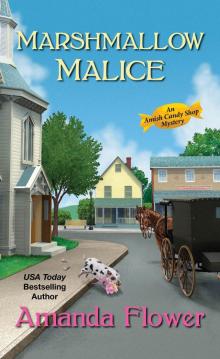 Marshmallow Malice
Marshmallow Malice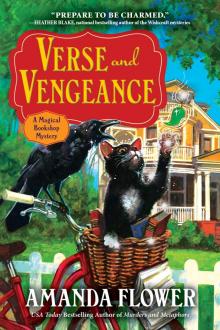 Verse and Vengeance
Verse and Vengeance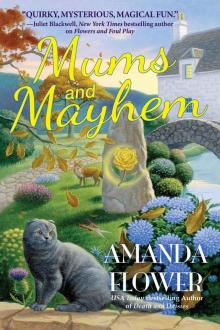 Mums and Mayhem
Mums and Mayhem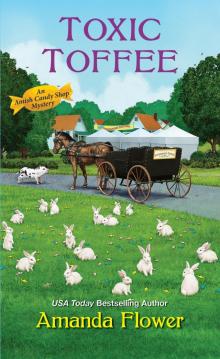 Toxic Toffee
Toxic Toffee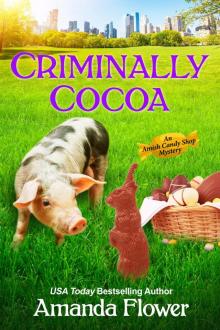 Criminally Cocoa
Criminally Cocoa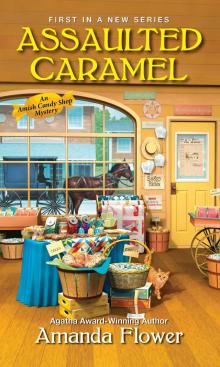 Assaulted Caramel
Assaulted Caramel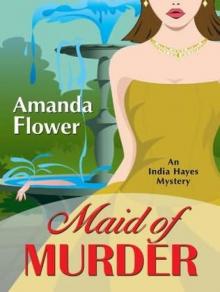 Maid of Murder aihm-1
Maid of Murder aihm-1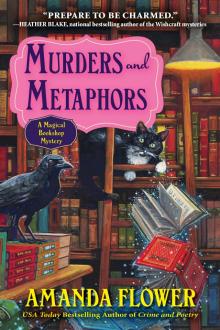 Murders and Metaphors
Murders and Metaphors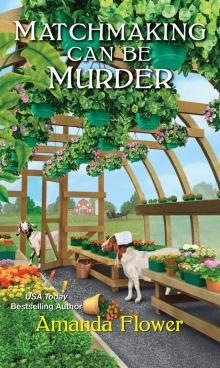 Matchmaking Can Be Murder
Matchmaking Can Be Murder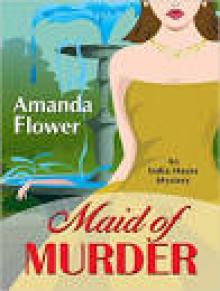 Maid of Murder (An India Hayes Mystery)
Maid of Murder (An India Hayes Mystery)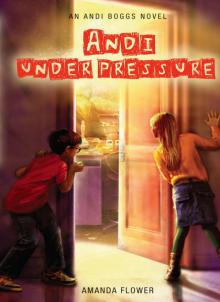 Andi Under Pressure
Andi Under Pressure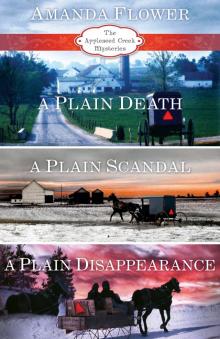 Appleseed Creek Trilogy, Books 1-3
Appleseed Creek Trilogy, Books 1-3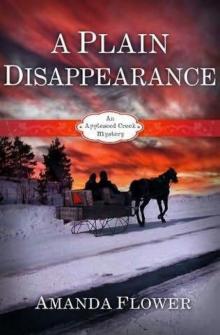 A Plain Disappearance
A Plain Disappearance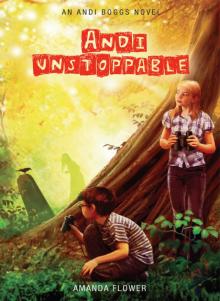 Andi Unstoppable
Andi Unstoppable The Final Vow
The Final Vow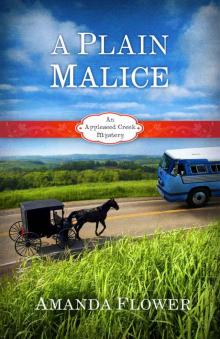 A Plain Malice: An Appleseed Creek Mystery (Appleseed Creek Mystery Series Book 4)
A Plain Malice: An Appleseed Creek Mystery (Appleseed Creek Mystery Series Book 4)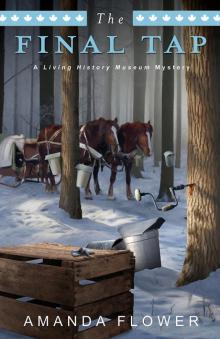 The Final Tap
The Final Tap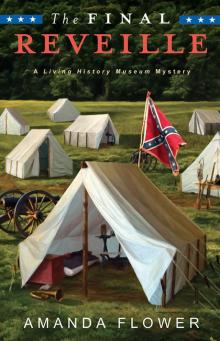 The Final Reveille: A Living History Museum Mystery
The Final Reveille: A Living History Museum Mystery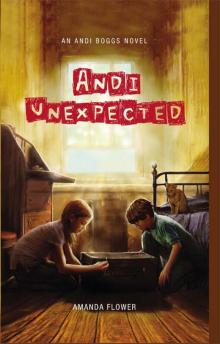 Andi Unexpected
Andi Unexpected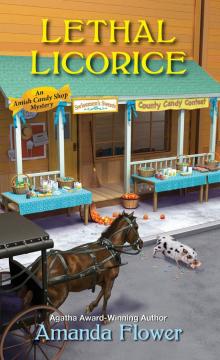 Lethal Licorice
Lethal Licorice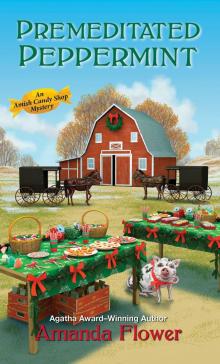 Premeditated Peppermint
Premeditated Peppermint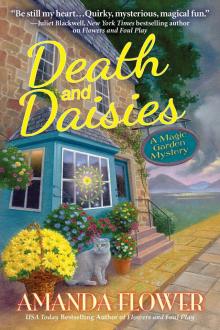 Death and Daisies
Death and Daisies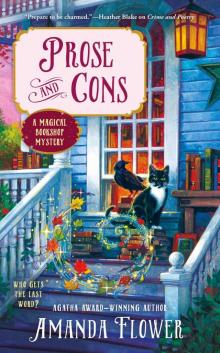 Prose and Cons
Prose and Cons